Welcome
The grace of Jesus the Christ, the love of God the Creator, and the communion of the Queer-making Spirit be with you all.
I am The Reverend Nicole Garcia, pastor of Westview Church in Boulder, CO. I welcome you all to this worship service to commemorate Pride. The mission statement of Extraordinary Lutheran Ministries is, “Freed and compelled by the Gospel of Jesus Christ to proclaim God’s love and seek justice for all, Extraordinary Lutheran Ministries envisions a church where all can serve God according to their callings.”
These powerful words were lived out through the decades when individuals were “Extraordinarily Ordained.” ELM enabled so many of my friends and colleagues to answer their call to ministry. These powerful words are lived out today as we witness the church lifting up more people from the LGBTQ+ community into positions of leadership.
Today we give thanks for those who endured the pain of rejection, but refused to leave the church they loved. Today we give thanks for those who have taken leadership roles in the church. Today we give thanks for those who will continue to tear down the walls that separate us, so the message of love and inclusion of Jesus Christ can become a reality.
Today, our worship service will include Holy Communion. You are invited to set a place for a patten and chalice near the place where you will participate in the service. If you would like to receive Holy Communion, have bread and wine or grape juice ready. Any kind of bread or gluten-free option is fine. Any cup will serve as your chalice for wine or juice. You may also choose to only use bread and it will still be a full experience of the sacrament. If you don’t feel comfortable with this way of receiving communion, that is fine. When the Words of Institution are uttered, you are invited to raise the bread or cup, respectively, at the same time, I am raising the bread or cup. In this way, we are church together.
Let us begin…
Call to Worship by Rev. Brenda Bos- Spoken by Rev. Nicole Garcia
Creative One,
You were in a very good mood the day You created us.
Fabulous and faithful, free and fierce
Made in Your own image.
Beautiful, brave.
Vulnerable, vibrant.
We are the people You have called us to be,
Liberated, Longing, Loving.
Filled with the hope of the rainbow, Set free by Your gifts of grace.
We marvel at your love
We bow to your mercy.
We live because of your forgiveness.
Join us in these moments
And in our lives
We offer once again
All of ourselves given to You,
Who first gave all of Yourself for us.
Alleluia, Alleluia, all praise and honor are Yours,
Now and forever,
All: Amen.
Thanksgiving for Baptism, adapted by Rev. Brenda Bos- Spoken by Nicole Garcia
We give you thanks, O God,
for, in the beginning, you called forth life from the waters of chaos.
At Stonewall our siblings met chaos with courage, shouting “No” so we now can receive “Yes”.
Through the waters of the flood, you delivered Noah and their family.
The Berkeley Four faced their own rising waters of fear and rejection,
But they held firm in their faith that you would save them from the maelstrom.
At the river, Jacob wrestles with your messenger and receives a blessing,
and you give him a new name.
In 2009 you gave us a new name: “Ordained” in the Evangelical Lutheran Church in America.
Through the sea, you led your people Israel into a new identity as a free people.
The extraordinarily ordained, those who came out later in life, those who never thought they would
Live to see same-gender marriage; we are now a free people.
At the Jordan, your Beloved was baptized by John and anointed with the Holy Spirit.
By water and your Word, you name us all as your beloved children,
All genders, all sexualities, all people, now claim themselves as
heirs of your promise and servants of all.
We praise you for the gift of water that sustains life,
Poured out for all people,
washed clean of the shame and fear the world
Wishes to put upon us.
Raised up to new life in Jesus Christ,
God’s most glorious gift,
Embodied in each of us through the Holy Spirit,
All praise to you, Living God, now and forever.
All: Amen.
Gathering Hymn Canticle of Turning- performed by Deacon John Weit and Rev. Matt James
An excerpt from Joel Workin’s Essay “The Prodigal Church”- Luke 15: 11-32 read by Greg Egertson
Usually, when we hear St. Luke’s story of God’s grace in the parable of the “Prodigal Child,” we the listeners are cast in the title role. Not a bad part, actually, since as the stars of the show we get to satisfy all of our carnal desire and still have things work out back home in the end. A sort of have-your-cake-and-eat-it-too role. And that great swine scene: “I will arise and go to my father!”
The other alternative, of course, is to be cast in the villain’s role and play the big bad Elder Sibling who will not cut anyone a break. Not a bad part either. Anyway, as I say, this is how it usually works out. Usually.
In the story of the Lesbian/Gay/Bisexual/Transgendered/Queer people and the church, however, the customary roles are reversed. The Church, God’s understudy, which usually retains for itself the role of warm and waiting Parent, is now the one that has taken the “journey to the far country.”
In this drama, with the Church off living its carnal and sinful life, LGBTQ Christians are suddenly thrust into the role of Forgiving Parent and are left standing, if I may use this rural image, by the mailbox at the end of the driveway waiting for the Prodigal to come home. What does it mean for the church’s LGBTQ people to play the part of this often overlooked, mostly inactive character of Forgiving Parent? If prodigality and hospitality have both been taken away, what is left to do? The parable answers back quite simply: wait.
It is curious to note that in the parable the Prodigal wises up without anybody’s assistance or advice (save the swine’s perhaps). Will the church do the same?
We as the grieved party, have the power of forgiveness. But, whereas one may forgive, it takes two to be reconciled.
Childish as the Church may seem and act, it is not a child. LGBTQ Christians, therefore, await a Church that comes home as an adult. Not happily perhaps, not jumping and skipping, even some fear and concern, but of its own will and confessing with its lips and heart that “I have sinned against you and against God.” A church which is dragged home, seduced or tricked home does not end the wait. No, we do better by waiting, waiting expectantly, lovingly and hopefully by the mailbox for a repentant return, rather than playing juvenile games about recognition, policy, and the like.
It is not easy to hope and to believe in future reconciliation when a loved one says “No, period,” and blithely walks away. It is not easy to stand ready to forgive and to welcome home with open arms. Personally, I would rather be the star and squander the family fortune. That sounds like a lot more fun. The parable, however, says, “Hope, believe, wait.” There is more to be said. This show is not over yet.
Just you wait.
Genesis 9:12-17- Bishop Susan Johnson of the Evangelical Lutheran Church in Canada
God said, “Here is the sign of the covenant between me and you and every living creature for ageless generations: I set my bow in the clouds, and it will be a sign of the covenant between me and the earth. When I bring clouds over the earth, my bow will appear in the clouds. Then I will remember the covenant that is between me and you and every kind of living creature, and never again will the waters become a flood to destroy all flesh. Whenever my bow appears in the clouds I will see it, and remember the everlasting covenant between God and every living creature on the earth.” God said to Noah, “This is the sign of the covenant that I have established between me and all living things on the earth.”
Psalm 13- Margaret Moorland
1 How long, YHWH? Will you forget me forever?
How long will you hide your face from me? 2 How long must I wrestle with my anguish,
and wallow in despair all day long?
How long will my enemy win over me? 3 Look at me! Answer me, YHWH, my God!
Give light to my eyes, lest I sleep the sleep of death, 4 lest my enemy say, “I have prevailed,”
lest my foes rejoice when I fall. 5 I trust in your love;
my heart rejoices
in the deliverance you bring. 6 I’ll sing to you, YHWH,
for being so good to me.
Gospel Matthew 10:40-42 “Those who welcome you also welcome me, and those who welcome me welcome the One who sent me. “Those who welcome prophets just because they are prophets will receive the reward reserved for the prophets themselves; those who welcome holy people just because they are holy will receive the reward of the holy ones. “The truth is, whoever gives a cup of cold water to one of these lowly ones just for being a disciple will not lack a reward.”
Sermon – Rev. Jen Rude
Hymn of the Day – San Francisco’s Gay Men’s Chorus- “Truly Brave”
Queer Christian Creed, Created by Rev. Emily E. Ewing, Rev. Brenda Bos, and Katy Miles-Wallace- Spoken by Rev. Asher O’Callaghan.
I believe in God the Creator,
who designed all good things,
including people of all gender identities and sexual orientations.
I believe in Jesus Christ, Sophia, the Word,
who came to earth to live among us,
who was born into a non-conventional family
that adored Jesus even when they didn’t totally get it,
who confounded authorities and comforted the oppressed.
Jesus was so hated by the Empire that they took the earthly body of God,
crucified it, mocked it, killed it,
and threw it in a grave as one of so many marginalized people..
Jesus knew personal Hell.
On the third day, God celebrated the wonder of the human body
and the power of resurrection over death and oppression.
Women were the first to declare Christ risen.
Jesus ascended into the realm of beauty,
and They continue to move among us,
blessing and sustaining us.
I believe in the Holy Spirit, all music, wonder, and strength.
I am a member of the Body of Christ.
I cherish the communion of the saints,
live because of the forgiveness of sin,
emulate the resurrection of the Body
and already experience life everlasting. Amen
Prayers of the People, adapted by Margarette Ouji from enfleshed.com
In the midst of chaos and calm, and all that keeps our spirits wild, overwhelmed, or troubled, we pause.
We pause to remember each other as those whose precious and precarious lives are inherently bound together. We pause to remember the gifts of water, of trees, of beauty, of the land each of us inhabits.
We pause to remember our neighbors – distant and near.
And so to the One who is Love, we bring the prayers of our communities. Where we share in joy or concern, let us respond together, “Beloved, as the world turns, hear our prayers.”
Let us pray…
We pray for our elders whose labor of love we show reverence to. We pray for St. Francis and First United, the first congregations that called our LGBQTIA+ siblings as their pastors thirty years ago. For the congregations that followed courageously and faithfully in their footsteps.
Beloved, as the world turns, hear our prayers.
For the ones who never tasted the freedom they fought for. For the ones who were forced to the fringes of their own movements. For the allies who suffered beside us, casting their lot with us in true solidarity. For the ones forgotten and betrayed.
Beloved, as the world turns, hear our prayers.
For the ones who are struggling with feelings of isolation and shame. For those who have no safe place or people to retreat to. For those who are unsafe in their homes and communities during this pandemic we find ourselves in.
Beloved, as the world turns, hear our prayers.
For the black and brown bodies who have been murdered by the state. For our black, brown and indigenous trans siblings. For the ones who speak truth to power. For the protestors who will not cease until justice is served. For the ones who took risks, who dreamed.
Beloved, as the world turns, hear our prayers.
For all those who hunger for justice and liberation today. For all who are suffering in the world and in our church at the hands of white supremacy. For those imprisoned by the state. For those whose land has been taken. For the land we occupy that does not belong to us. For the earth that groans beneath us. For those without food or shelter. For those who have yet to repent.
Beloved, as the world turns, hear our prayers.
We pray in gratitude for all that nourishes and sustains us. For the gifts of beauty and friendship, shared meals, and art, and love. For laughter. For pleasure. For the friends, lovers, and comrades who lift our spirits, always by our side when the days are heavy. For the freedom we have in Christ.
Beloved, as the world turns, hear our prayers.
For your presence within and around us, in our highs and lows, and everywhere in between. In our hope and our despair, Creator, we give you thanks. Hear our prayers and deepen our willingness to show up with and for one another, sharing in each other’s burdens and working for one another’s protection and care. Amen.
OFFERING
If you would like to make an offering to ELM please click here: https://bit.ly/elmoffering
Offering Music “Gracious Spirit, Heed our Pleading” provided by Tasha Gerken-Nelson & Rev. Amanda Gerken-Nelson
HOLY COMMUNION
God is with you.
And also with you.
Lift up your hearts.
We lift them to God.
Let us give thanks to God.
It is right to give our thanks and praise.
It is indeed right our duty and our joy
That we should at all times and in all places
Give thanks and praise to you
Lifegiving God.
We thank you, divine Seamstress
For you never stop creating.
From the dawn of time, in our mother’s womb, and even in the age to come,
Your creativity is as endless as eternity.
Even today you are knitting us your people
Into a garment of many colors.
We thank you, Holy Spirit,
For you do not allow us to grow complacent.
You stir up dreams and visions within us
Making us restless for a new Heaven and a new Earth.
You clothe us with power to bring these dreams to life.
In you, we are beginning to see all things anew.
We thank you, Christ our Savior
For your wondrous transformation
Word made into flesh.
You challenge us with foreign experiences
Teaching us that those we thought were strange and cut off
Are members in your holy body.
Therefore, with Joseph and all of Israel’s children,
With the confused disciples and the Ethiopian eunuch,
With all who have shown us your way,
All who have gone before us,
And all those we gather with this day,
We praise your name:
Holy, holy, holy God of power and might. Heaven and earth are full of your glory. Hosanna in the highest. Blessed is the one who comes in the name of God. Hosanna in the highest.
Jesus is made known to us in the breaking of bread
and in the pouring out of the Holy Spirit.
We remember how, on the night before he was
crucified, Jesus took bread, gave thanks broke it and said,
this is the bread of life.
Every time you eat it together, remember me.
Again, after supper, Jesus took the cup,
gave thanks, and gave it for all to drink, saying:
this cup is God’s love poured out for you
and for all people for the forgiveness of sin,
whenever you drink it, remember me.
We remember that night Jesus spent with his friends,
and we feel their presence with us now,
brought into our midst by faith and love,
opening our eyes to a new reality.
We ask God, through the Holy Spirit
to bless these gifts we offer and share,
making them Christ’s body and blood,
and we Christ’s holy people.
Together with all the church, we give you thanks:
Creator, Redeemer, Spirit of love.
Bind us together. Open our hearts.
Grant us peace. Amen.
Lord’s Prayer
Using the language of your own heart, let us pray together the prayer Jesus taught us: (you may use the following or other similar words in any language)
Our Parent who art in heaven, hallowed be thy name.
Thy reign come.
Thy will be done on earth as it is in heaven.
Give us this day our daily bread.
Forgive us our trespasses as we forgive those who trespass against us.
Lead us not into temptation, but deliver us from evil.
For thine is the reign, the power, and the glory, forever and ever. Amen.
INVITATION TO COMMUNION
Come and your souls will be fed. Come at the Holy One’s invitation and eat
the bread of salvation; drink of Jesus’s love poured out for you.
Before we share communion, let us pray together:
God, in this time of physical separation from our church
family, we give you thanks as we partake in your gift of grace,
Holy Communion. As we receive this meal, remind us of your
forgiveness and promise of eternal life. This we pray in Jesus’
holy name. Amen.
COMMUNION
This is the body of Christ given for you.
Amen
This is the blood of Christ shed for you.
Amen
Post-Eucharistic Prayer:
Queer-making Spirit, you made darkness and light and twilight called them good; sea and dry land and everything in between; genders trans, cis and all that is beyond and outside. Yet this world, this life, and this feast are but a foretaste of your celestial realm. Nourish our hearts and bodies so that the loves we have fought for, fuel us to keep fighting until the kin-dom of God is come. We ask this in the name of the one, holy, and undivided Trinity.
Sending Song – “Beloved” – The Eschatones (Caitlin, Emily, Anne, Carolina & Christina)
BLESSING
Neither death, nor life, nor angels, nor rulers,
nor things present, nor things to come,
nor powers, nor height, nor depth,
nor anything else in all creation,
will be able to separate us from the love of God in Christ Jesus.
God, the creator, ☩ Jesus, the Christ,
and the Holy Spirit, the comforter,
bless you and keep you in eternal love.
Amen.
Today’s Worship Leaders
Presiding: Rev. Nicole Garcia
Preaching: Rev. Jen Rude
Priests for Equality. The Inclusive Bible. Sheed & Ward. Kindle Edition.

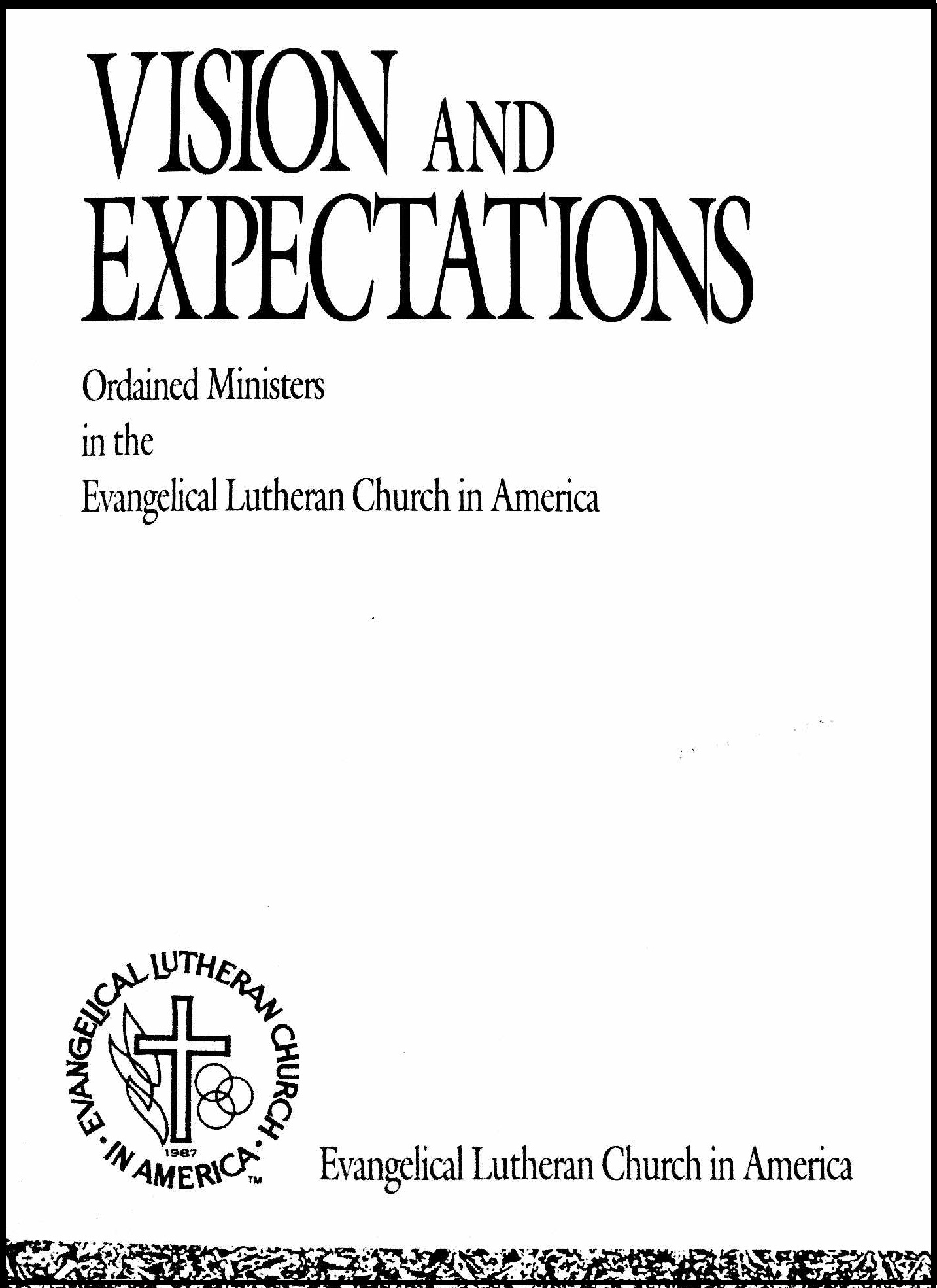

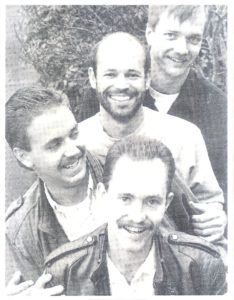
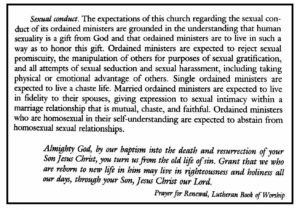
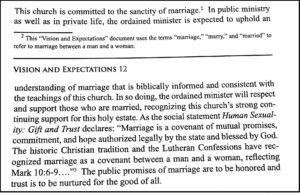
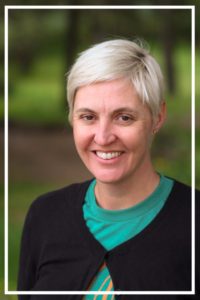

 Bio: Anders Nelson (he/they) is the pastor of the Mabel/Henrytown Tri-Point Parish in Mabel, Minnesota where he’s been serving three congregations since December 2024. Their interests in ministry center around inviting communities to tell their own story, including recognizing how their story fits into the larger narrative God is weaving throughout all time and space. In his spare time, you can find Anders playing plenty of board games, singing and dancing on stage and off, and participating in way too many Dungeons and Dragons campaigns.
Bio: Anders Nelson (he/they) is the pastor of the Mabel/Henrytown Tri-Point Parish in Mabel, Minnesota where he’s been serving three congregations since December 2024. Their interests in ministry center around inviting communities to tell their own story, including recognizing how their story fits into the larger narrative God is weaving throughout all time and space. In his spare time, you can find Anders playing plenty of board games, singing and dancing on stage and off, and participating in way too many Dungeons and Dragons campaigns.
 Author Bio: Tom Gehring (He/They) is a pastor currently working as a chaplain in Metro Chicago providing spiritual care for individuals living with, or at risk for HIV. In their free time Tom loves to DJ, spend time outside, play lots of games (both video and board), read excessively thick fantasy novels, and work out with his lovely gym community. Tom has been serving as a member of ELM’s board of directors since October of ’23 and is honored to be a part of this ministry.
Author Bio: Tom Gehring (He/They) is a pastor currently working as a chaplain in Metro Chicago providing spiritual care for individuals living with, or at risk for HIV. In their free time Tom loves to DJ, spend time outside, play lots of games (both video and board), read excessively thick fantasy novels, and work out with his lovely gym community. Tom has been serving as a member of ELM’s board of directors since October of ’23 and is honored to be a part of this ministry.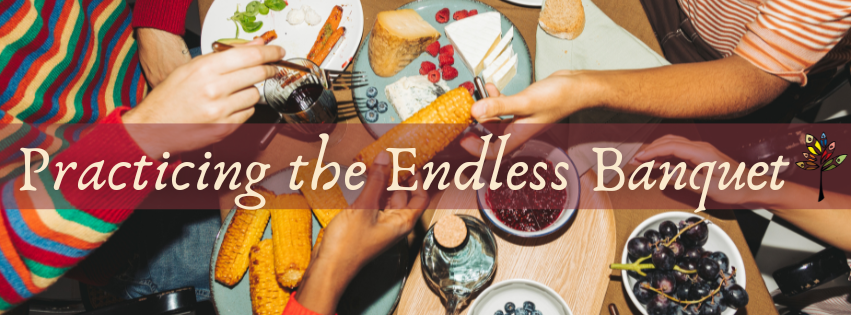

 Bio: Bergen Eickhoff (they/them) is a pastor, poet, and mercenary pianist living in Tacoma, Washington. They currently work in Children, Youth and Family ministry in Olympia, Washington, where they enjoy great Music and better coffee. They are bisexual and nonbinary, and love to be loud about both of those identities. They have been a member of Proclaim since 2021 and currently serve as the Proclaim Relator To the ELM Board. You can find their writings on their Substack pages (
Bio: Bergen Eickhoff (they/them) is a pastor, poet, and mercenary pianist living in Tacoma, Washington. They currently work in Children, Youth and Family ministry in Olympia, Washington, where they enjoy great Music and better coffee. They are bisexual and nonbinary, and love to be loud about both of those identities. They have been a member of Proclaim since 2021 and currently serve as the Proclaim Relator To the ELM Board. You can find their writings on their Substack pages (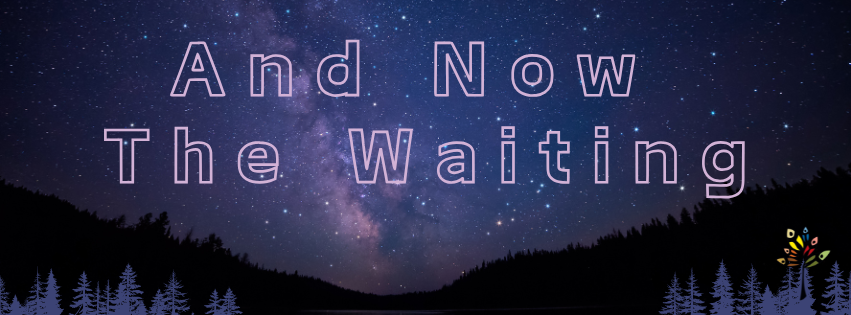
 About this author: Mycah McNett graduated with honors in Biblical and Lutheran studies from United Lutheran Seminary. She was called as the second pastor at Saint Luke Lutheran Church in Devon, PA in the summer of 2023. Before seminary, she served in church communication and youth ministry roles in Harrisonburg, VA, and was an ELCA Young Adult in Global Mission participant. Since 2022 Pastor Mycah has served on the Board of Directors for Extraordinary Lutheran Ministries and is an active member of the Proclaim Community for LGBTQIA+ Lutheran Rostered Leaders. Pastor Mycah lives in Downingtown with her spouse, Alyssa, and three cats, Minnie, Clio, and Clem.
About this author: Mycah McNett graduated with honors in Biblical and Lutheran studies from United Lutheran Seminary. She was called as the second pastor at Saint Luke Lutheran Church in Devon, PA in the summer of 2023. Before seminary, she served in church communication and youth ministry roles in Harrisonburg, VA, and was an ELCA Young Adult in Global Mission participant. Since 2022 Pastor Mycah has served on the Board of Directors for Extraordinary Lutheran Ministries and is an active member of the Proclaim Community for LGBTQIA+ Lutheran Rostered Leaders. Pastor Mycah lives in Downingtown with her spouse, Alyssa, and three cats, Minnie, Clio, and Clem.

 In April, the ELM Board began working with Rozella Haydee-White and RHW Consulting to coach the board in clarifying our vision for the ministry of ELM in this current and emerging moment. Specifically, Rozella and the board are working to 1) solidify ELM’s strategic direction, defining and prioritizing ELM’s programs, 2) navigate and strategize for the process of hiring and onboarding new staff, and 3) overall clarifying and communicating ELM’s identity and function. We are grateful for the ways in which Rozella has helped the board thus far and look forward to the remaining 6 months of working together.
In April, the ELM Board began working with Rozella Haydee-White and RHW Consulting to coach the board in clarifying our vision for the ministry of ELM in this current and emerging moment. Specifically, Rozella and the board are working to 1) solidify ELM’s strategic direction, defining and prioritizing ELM’s programs, 2) navigate and strategize for the process of hiring and onboarding new staff, and 3) overall clarifying and communicating ELM’s identity and function. We are grateful for the ways in which Rozella has helped the board thus far and look forward to the remaining 6 months of working together. Bio: Tom Gehring (He/They) is a pastor currently working as a chaplain in Metro Chicago providing spiritual care for individuals living with, or at risk for HIV. In their free time Tom loves to DJ, spend time outside, play lots of games (both video and board), read excessively thick fantasy novels, and work out with his lovely gym community. Tom has been serving as a member of ELM’s board of directors since October of ’23 and is honored to be a part of this ministry.
Bio: Tom Gehring (He/They) is a pastor currently working as a chaplain in Metro Chicago providing spiritual care for individuals living with, or at risk for HIV. In their free time Tom loves to DJ, spend time outside, play lots of games (both video and board), read excessively thick fantasy novels, and work out with his lovely gym community. Tom has been serving as a member of ELM’s board of directors since October of ’23 and is honored to be a part of this ministry. Bio: Mycah McNett (she/her) is a 2023 graduate of United Lutheran Seminary and is ordained in the ELCA. Mycah holds a Bachelor of Science in Biology from James Madison University, specializing in environmental and evolutionary fields as well as anthropology. After college, she served as a Young Adult in Global Mission through the ELCA. Before attending seminary, Mycah served as a lay staff member in a Lutheran congregation where she worked with communication, youth, and young adult ministries. Currently, Mycah is located just outside Philadelphia, PA with her spouse and three cats: Clem, Clio, and Minnie.
Bio: Mycah McNett (she/her) is a 2023 graduate of United Lutheran Seminary and is ordained in the ELCA. Mycah holds a Bachelor of Science in Biology from James Madison University, specializing in environmental and evolutionary fields as well as anthropology. After college, she served as a Young Adult in Global Mission through the ELCA. Before attending seminary, Mycah served as a lay staff member in a Lutheran congregation where she worked with communication, youth, and young adult ministries. Currently, Mycah is located just outside Philadelphia, PA with her spouse and three cats: Clem, Clio, and Minnie. 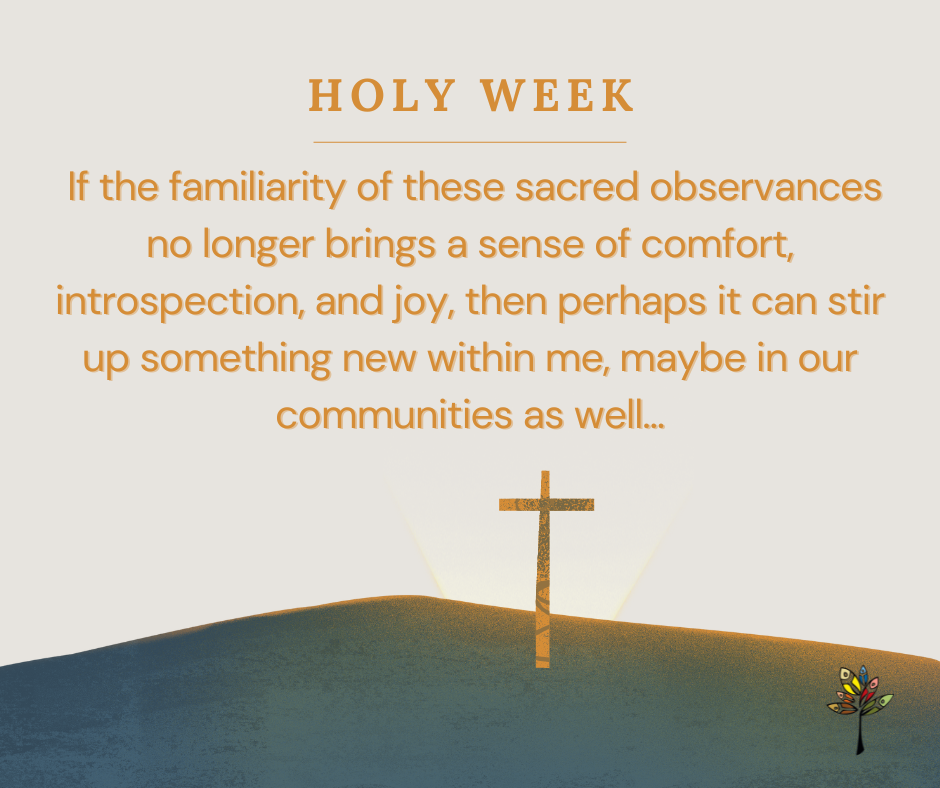



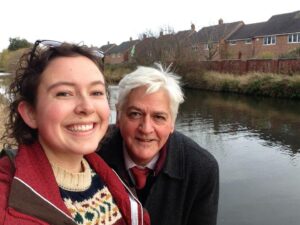
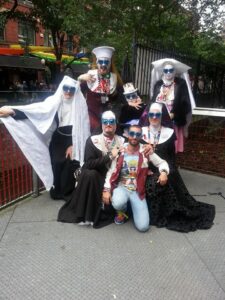 (Left Photo) Alan and Mycah on a walk along a canal – he loved to walk around Manchester and share the city with me.
(Left Photo) Alan and Mycah on a walk along a canal – he loved to walk around Manchester and share the city with me.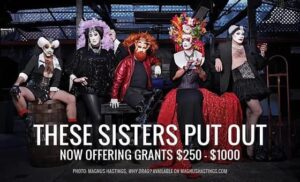 The Sisters of Perpetual Indulgence are celebrating their 45th anniversary this Easter, and are distributing $45,000 in grants! The $250-$1000 grants are for projects that serve the Bay Area or particularly embattled communities in other locales around the country and the world that promote wellness, joy, tolerance, and diversity within our communities. Find out more about the grants and how to apply here.
The Sisters of Perpetual Indulgence are celebrating their 45th anniversary this Easter, and are distributing $45,000 in grants! The $250-$1000 grants are for projects that serve the Bay Area or particularly embattled communities in other locales around the country and the world that promote wellness, joy, tolerance, and diversity within our communities. Find out more about the grants and how to apply here.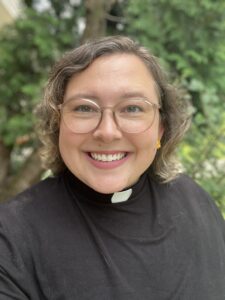 The Rev. Mycah McNett graduated with honors in Biblical and Lutheran studies from United Lutheran Seminary. She was called as the second pastor at Saint Luke Lutheran Church in Devon, PA in the summer of 2023. Before seminary, Pastor Mycah served in church communication and youth ministry roles in Harrisonburg, VA, and was an ELCA Young Adult in Global Mission participant. Since 2022 Pastor Mycah has served on the Board of Directors for Extraordinary Lutheran Ministries, and is an active member of the Proclaim Community for LGBTQIA+ Lutheran Rostered Leaders. Pastor Mycah lives in Downingtown with her spouse, Alyssa, and three cats, Minnie, Clio, and Clem.
The Rev. Mycah McNett graduated with honors in Biblical and Lutheran studies from United Lutheran Seminary. She was called as the second pastor at Saint Luke Lutheran Church in Devon, PA in the summer of 2023. Before seminary, Pastor Mycah served in church communication and youth ministry roles in Harrisonburg, VA, and was an ELCA Young Adult in Global Mission participant. Since 2022 Pastor Mycah has served on the Board of Directors for Extraordinary Lutheran Ministries, and is an active member of the Proclaim Community for LGBTQIA+ Lutheran Rostered Leaders. Pastor Mycah lives in Downingtown with her spouse, Alyssa, and three cats, Minnie, Clio, and Clem.